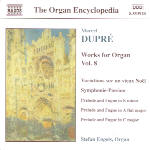Volume Eight in Naxos’ complete Marcel Dupré organ works cycle offers a judicious sampling of Dupré’s wide-ranging style at its best. The organist/composer’s renowned Symphonie-Passion crackles with rhythmic momentum and dense, uplifting harmonic movement. Stefan Engels brings out the first movement’s exuberant agitated qualities with subtle accentuation but loses cumulative focus in the fourth movement’s final pages. On the other hand, Engels’ deft registrations and crisp articulation bring out the color and rather dark humor implicit throughout Dupré’s variations on the melody Noël Nouvelet. The swirling rigor of the three Op. 36 Preludes and Fugues is cogently transpired through Engels’ busy hands and feet. Naxos’ engineering is slightly dry compared to the hefty resonance that distinguishes Daniel Roth’s gorgeous Symphonie-Passion, recorded for Motette on the Saint-Sulpice organ long associated with Dupré. Still, listeners new to this repertoire can’t go wrong for the price, and the booklet notes are succinctly informative.
































